There’s no finicky yeast, no need to rise, and no waiting for hours and hours.
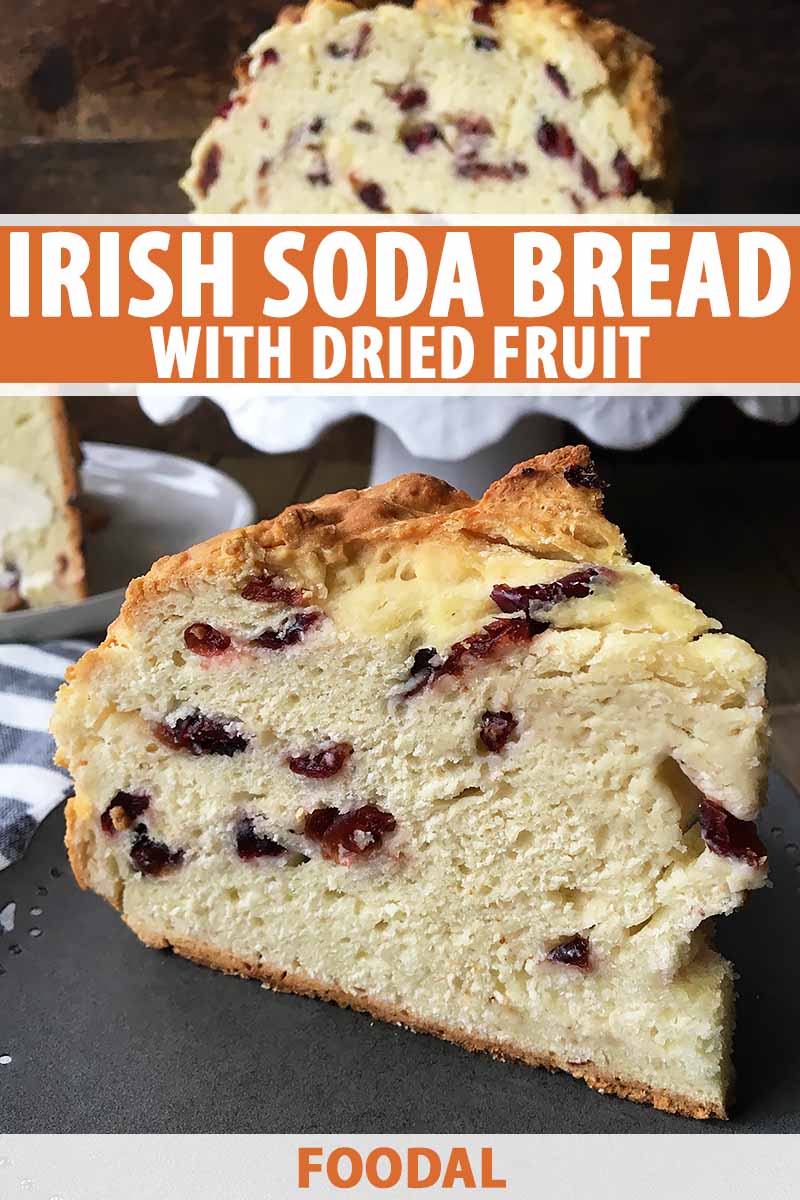
This recipe is a gem. A gem!
If you’re a beginner baker, and want to try your flour-coated hand at bread making, I’d recommend starting with this St. Patrick’s Day classic.
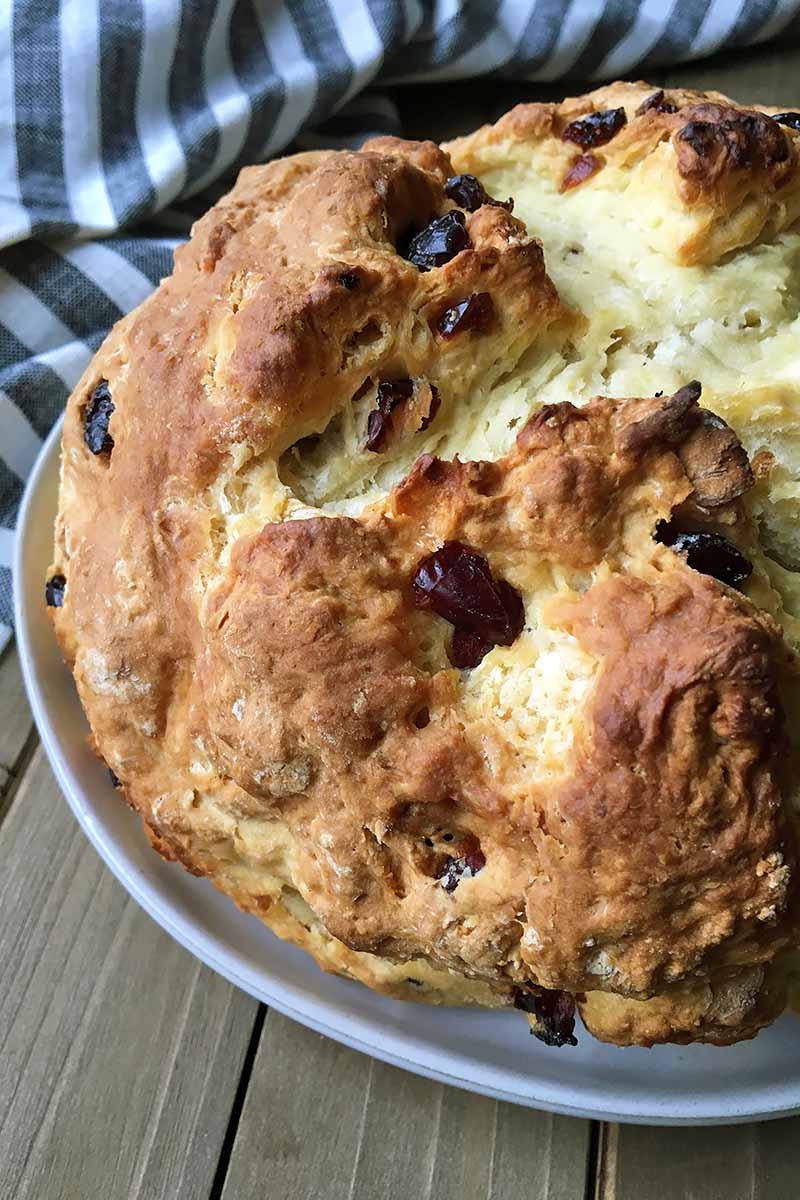
Crusty on the outside, hearty and dense on the inside, Irish soda bread is a rustic baked good that’s so quick and easy to make completely from scratch.
It has been a staple amongst many Irish families for decades. With it’s affordable round-up of simple ingredients and ease of making, this wholesome round of tasty carbs will keep any hungry belly full for quite some time.
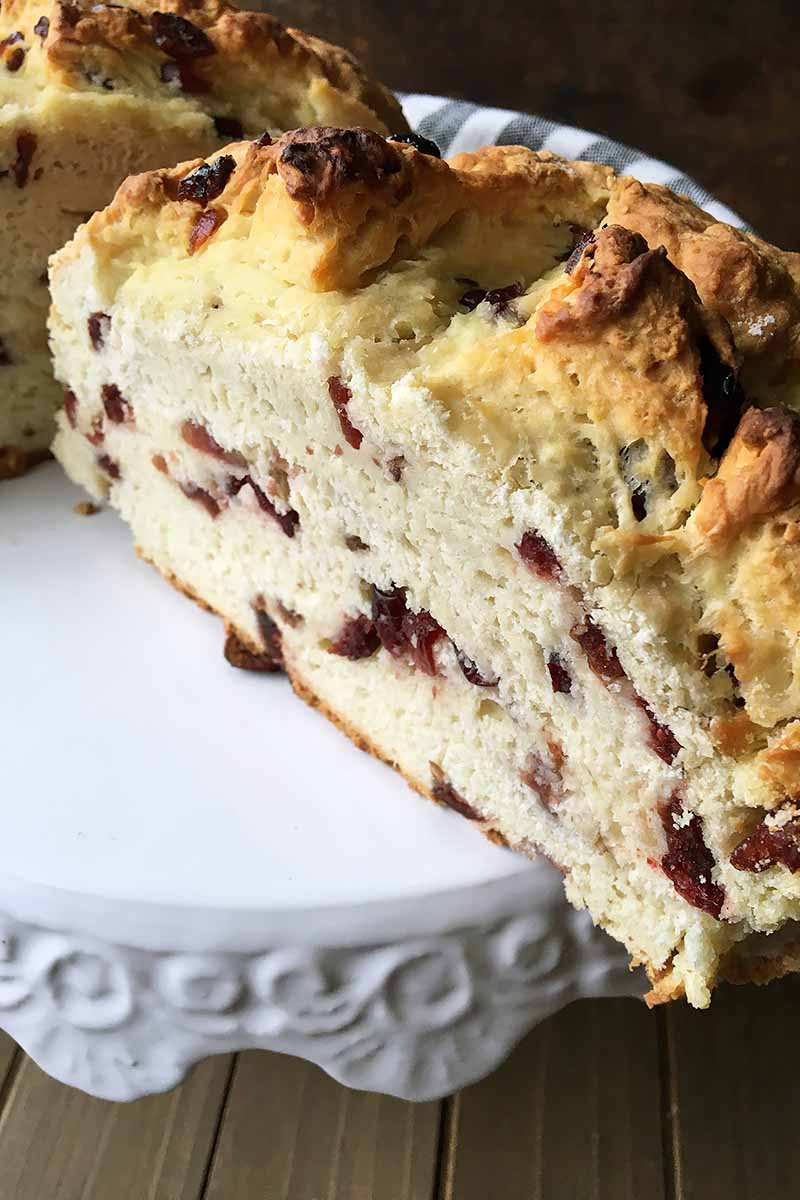
And true to its name, it relies on a chemical leavening agent – baking soda. It reacts with the acidity in the buttermilk to cause the dough to rise as it’s in the oven.
You don’t have to worry about yeast like you would for other traditional bread recipes (though we have an amazing guide for learning all about yeast), which means there is no need to wait for the dough to proof before you bake it.
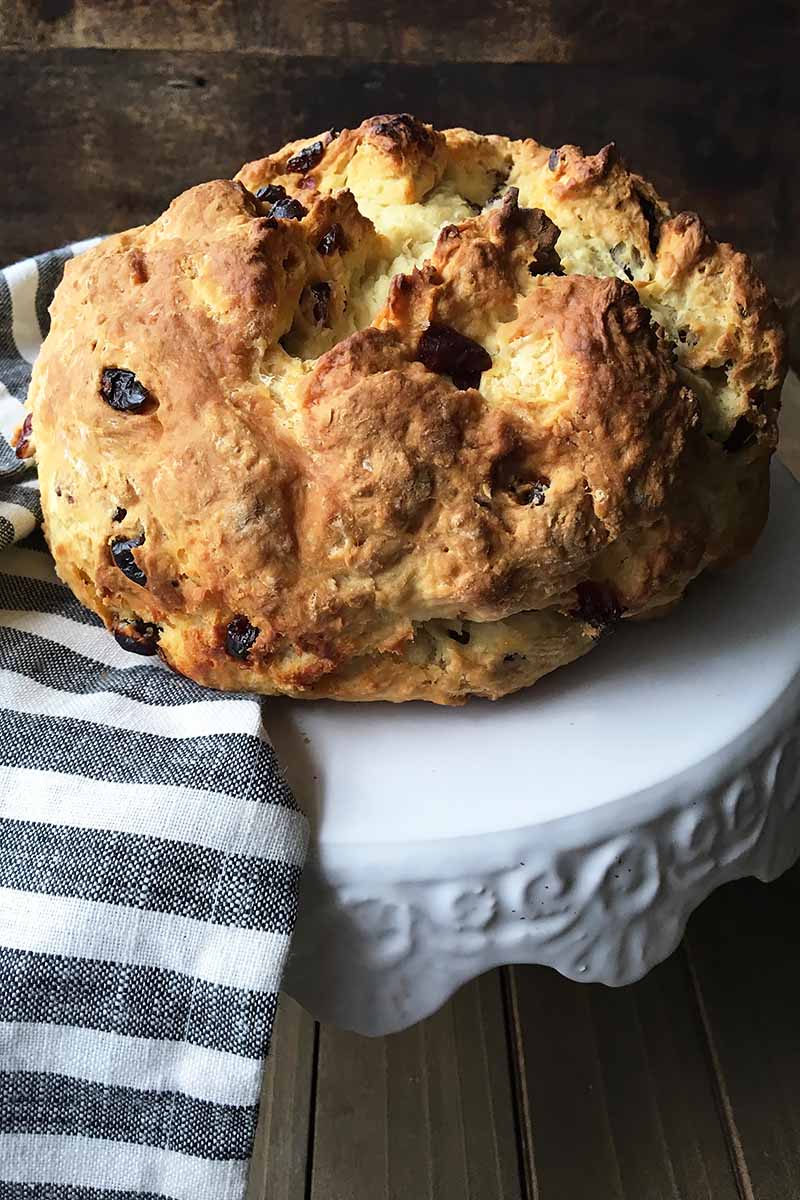
Once you make the dough, just shape it in a ball, place in a greased cake pan, and bake until it’s beautifully puffed and golden brown.
And don’t forget to score it before you bake it!
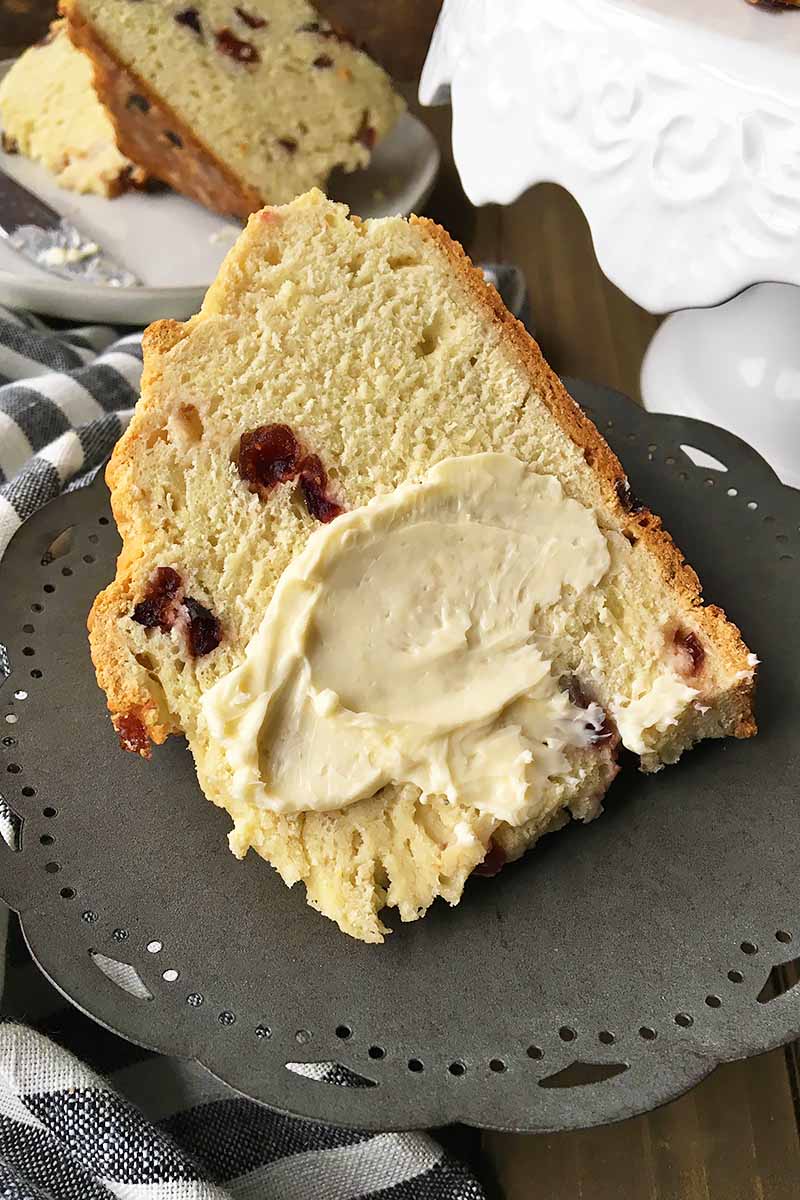
Other than helping the dough rise without forming a crust too prematurely, the “X” scored on the top has been a traditional symbol of the religious cross.
Start planning your Saint Patrick’s Day menu now, and make this recipe the top of the list!
Print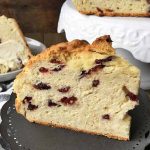
Irish Soda Bread with Dried Fruit
- Total Time: 1 hour 35 minutes
- Yield: 1 large bread loaf 1x
Description
Crusty on the outside, hearty and dense on the inside, Irish soda bread is a rustic baked good that’s easy to make all from scratch.
Ingredients
- 4 cups all-purpose flour, plus more for dusting
- 1 tablespoon granulated sugar
- 1 1/2 teaspoons baking soda
- 1 teaspoon salt
- 1/2 stick (4 tablespoons) unsalted butter
- 1 1/2 cups buttermilk
- 1 large egg, beaten
- 1 cup dried currants or cranberries, optional
- 1/2 cup Irish whiskey, optional
Instructions
- Preheat the oven to 400°F. Lightly grease and flour an 8-inch round cake pan.
- Optional: soak the cranberries in whiskey for 30 minutes to one hour. Drain and discard any leftover whiskey. Set aside.
- Sift together the flour, sugar, baking soda, and salt in a large bowl. Cut in the butter with a pastry cutter until the pieces are the size of very small peas and coated completely in flour.
- Create a well in the center, and pour in the buttermilk and beaten egg. Slowly stir together the liquid and dry ingredients with a sturdy spoon until a thick, sticky, shaggy dough starts to form. Add the cranberries and mix. You can use your hands, if preferred.
- Turn dough out onto a floured surface. Knead gently just a few times to form the dough into a slightly sticky ball. Place into the prepared pan. Flatten it out slightly so that the dough nearly touches the edges of the pan.
- Score a large X into the surface of the dough with a sharp knife, only going about 1/4- inch deep.
- Bake for 40-45 minutes, turning the pan halfway through, until the crust is a deep golden brown color and the scored surface no longer looks wet.
- Remove from the oven and let cool for 10 minutes before removing from the pan and placing on a cooling wrack.
- Cut into slices and serve with butter while still warm.
- Prep Time: 50 minutes
- Cook Time: 45 minutes
- Category: Bread
- Method: Baking
- Cuisine: Baked Goods
Keywords: bread, Irish recipes, Saint Patrick's Day
Cooking by the Numbers…
Step 1 – Prep
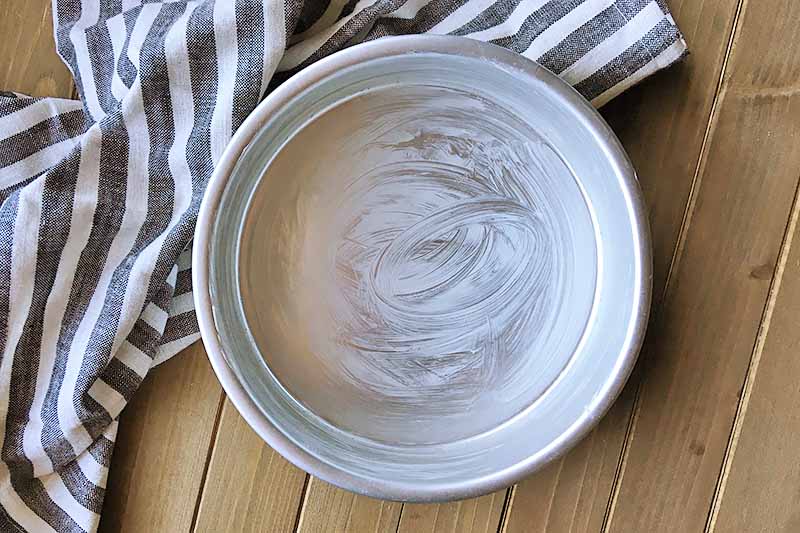
Measure out all of the ingredients.
Grease and flour an 8-inch round cake pan with flour and unsalted butter. Set aside.
Step 2 (Optional) – Soak the Dried Fruit
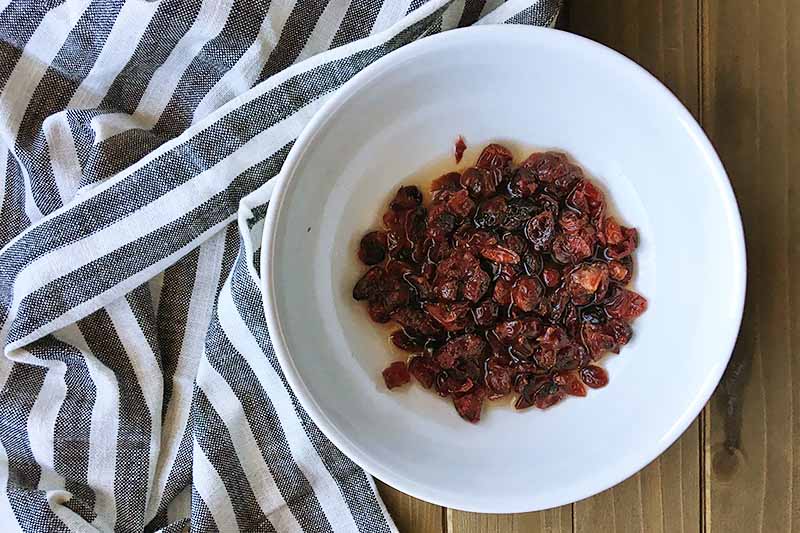
Combine the whiskey and dried fruit in a small bowl. Let sit and macerate for about 1 hour. Discard any excess whiskey.
Curious about what currants are? Read all about the fresh fruit now!
Step 3 – Combine the Dry Ingredients
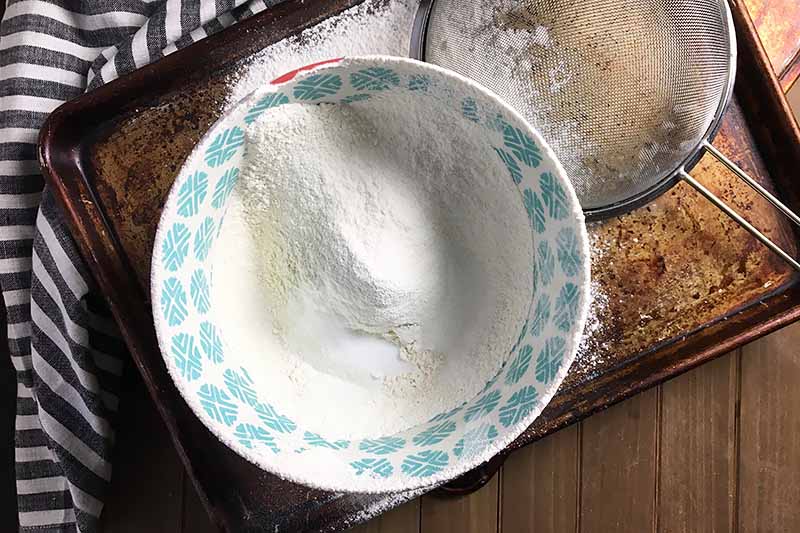
Sift together the all-purpose flour, granulated sugar, baking soda, and salt in a large bowl.
It’s best to use all-purpose flour rather than bread flour for this recipe – you want the bread to still be soft and tender on the inside, without developing too much gluten with a higher protein flour.
Step 4 – Add the Butter
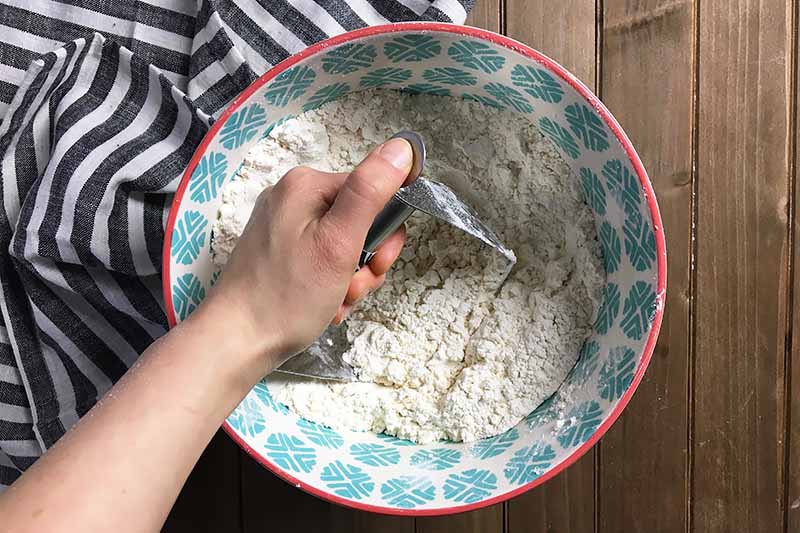
With a pastry cutter, mix and cut in the butter into the dry ingredients, until the butter is the size of small peas all coated in flour.
Step 5 – Add the Wet Ingredients
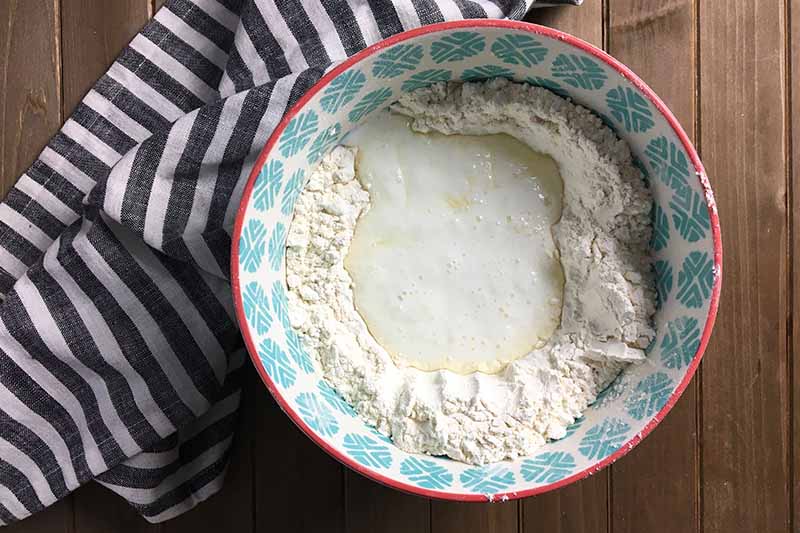
Create a deep well in the center of the dry mix. Pour in the beaten egg and buttermilk.
Using your hands or a sturdy spoon, slowly combine the ingredients together until thick, very wet, and very shaggy dough forms, adding the dried fruit as you’re stirring.
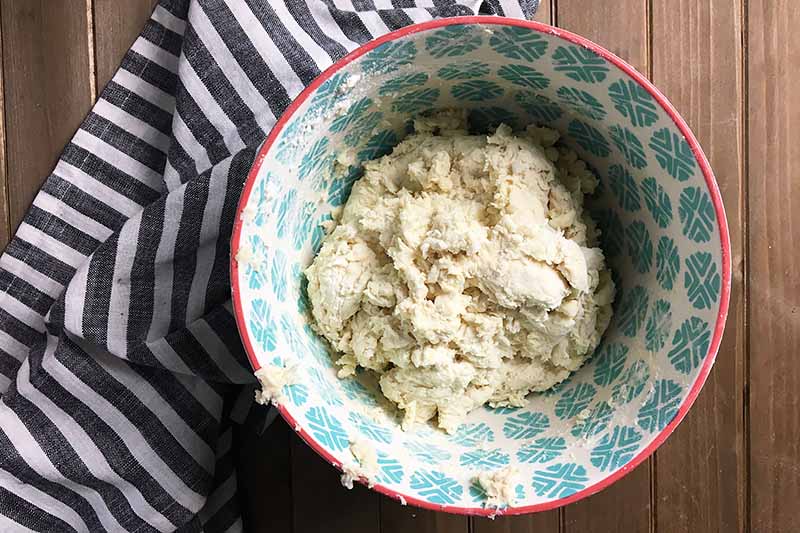
Step 6 – Gently Knead
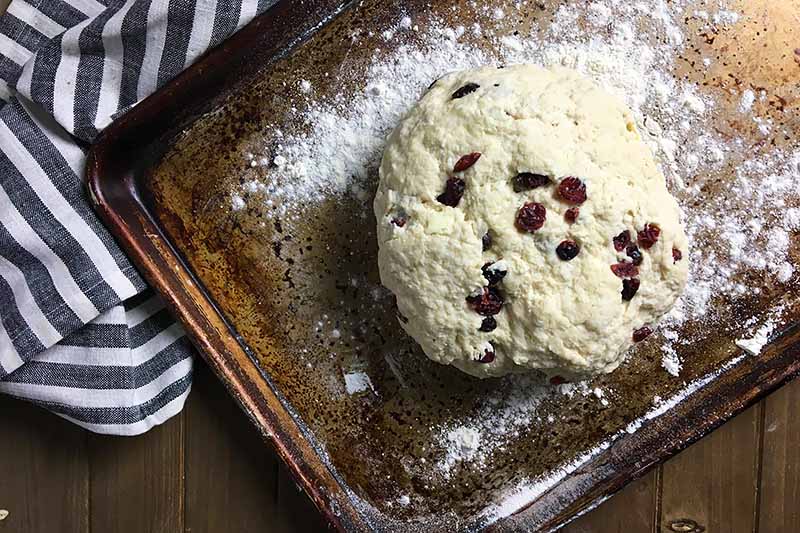
Turn out onto a lightly floured surface. Gently knead for just a few seconds to develop a round of dough. It will still be slightly sticky.
Do not over-knead! Again, the final bread should be soft and tender on the inside. If you knead it too much, it will become tougher and chewier.
Step 7 – Score
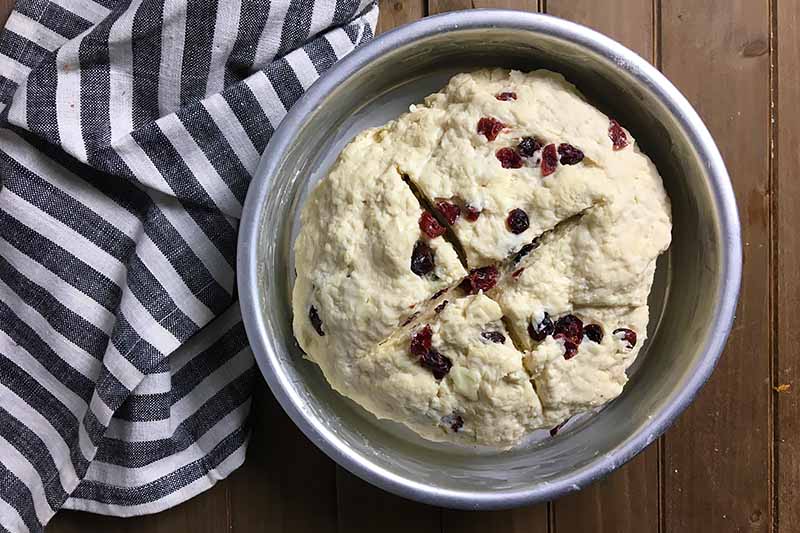
Place the dough in the prepared cake pan.
Score a large X into the surface of the dough with a sharp paring knife, only going about 1/4 of an inch deep.
Scoring helps the dough expand, and not create a crust too prematurely while the bread is still rising. Don’t go too deep with the cut – cutting too deeply will compromise the structure of the dough as it is baking.
Step 8 – Bake
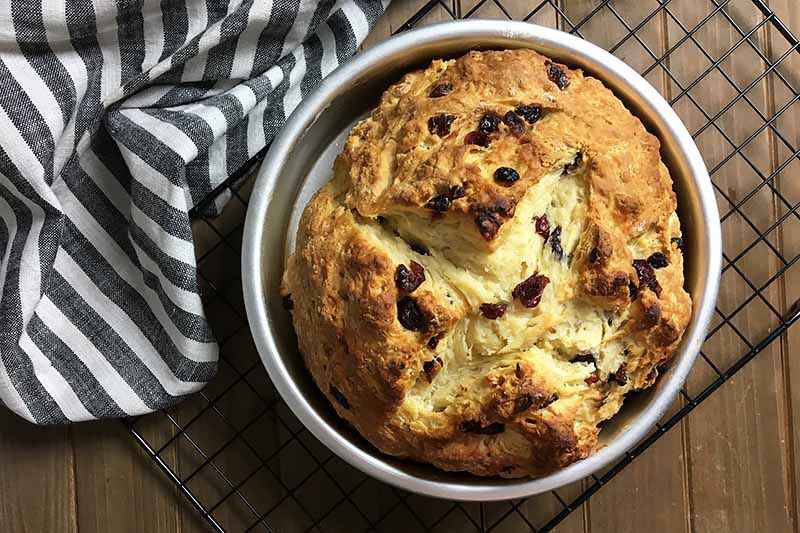
Bake for 30-45 minutes, turning the pan halfway through, until the crust is a deep golden brown color and the scored surface no longer looks wet.
If the crust is looking too dark while there is still a lot of time left to bake, tent a piece of aluminum foil over the top.
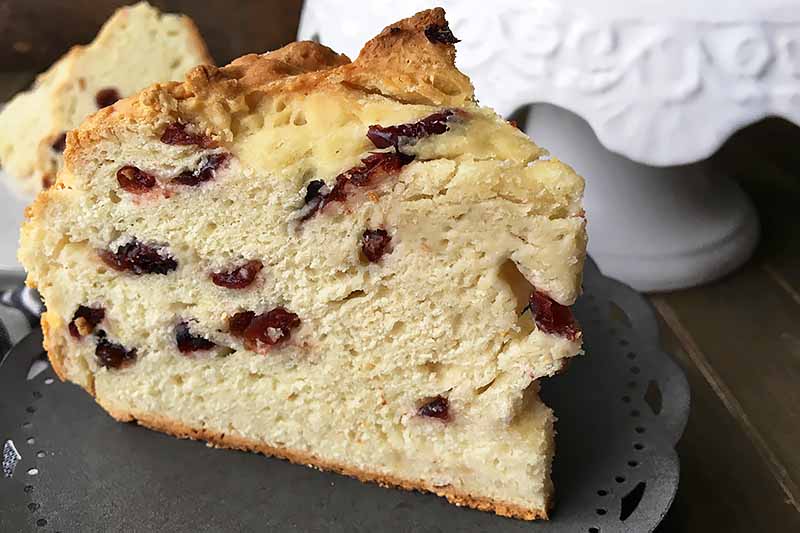
Remove from the heat and let sit for 10 minutes before removing from the pan too cool on a wire rack.
Serve warm and enjoy with thick smears of butter or jams and jellies!
Booze It Up!
Plain dried fruit is great. It is.
Buuuuuuttttt…
In the spirit (ha, ha, ha.) of Saint Patrick’s Day, why not let those shriveled raisins, cranberries, or currents plump up and have some fun?
You have the option to soak the dried fruit in whiskey for an hour or so before adding it to the dough.
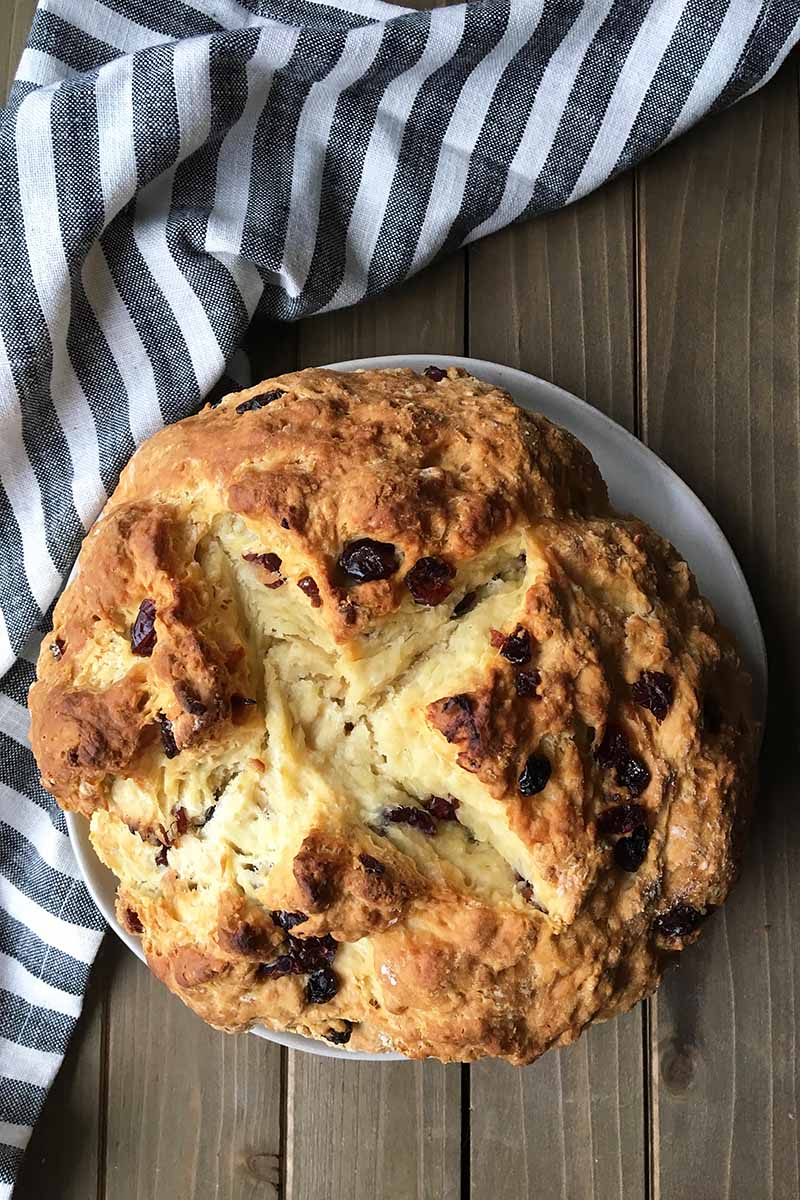
It imparts a subtle flavor, not too strong, actually! Give it a try for your next batch.
Do you like this no-yeast bread? What do you think of soaking the dried fruit in whiskey? Leave a comment below, after you rate my recipe. And look at all of our bread recipes, while you’re reading through our website! We’d recommend another fruit-bedazzled bread that’s easy to make, like our Whole Wheat Pecan Bread with Dried Blueberries.
For Other Saint Paddy’s Day dishes, try these below:
Photos by Nikki Cervone, © Ask the Experts, LLC. ALL RIGHTS RESERVED. See our TOS for more details.
Nutritional information derived from a database of known generic and branded foods and ingredients and was not compiled by a registered dietitian or submitted for lab testing. It should be viewed as an approximation.
About Nikki Cervone
Nikki Cervone is an ACS Certified Cheese Professional and cheesemonger living in Pittsburgh. Nikki holds an AAS in baking/pastry from Westmoreland County Community College, a BA in Communications from Duquesne University, and an MLA in Gastronomy from Boston University. When she's not nibbling on her favorite cheeses or testing a batch of cupcakes, Nikki enjoys a healthy dose of yoga, wine, hiking, singing in the shower, and chocolate. Lots of chocolate.

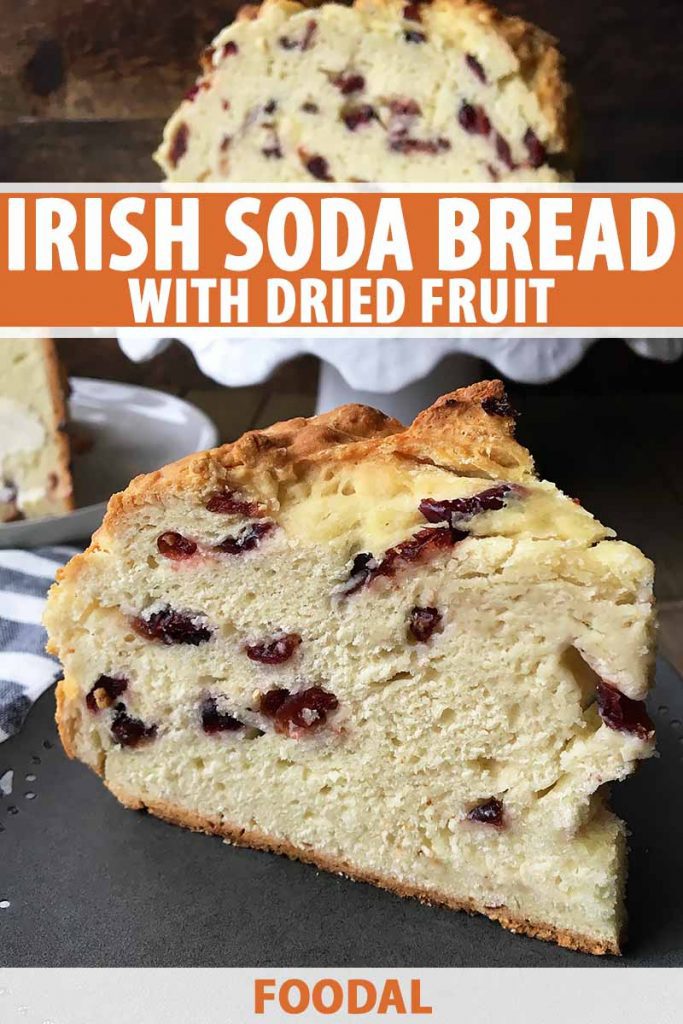

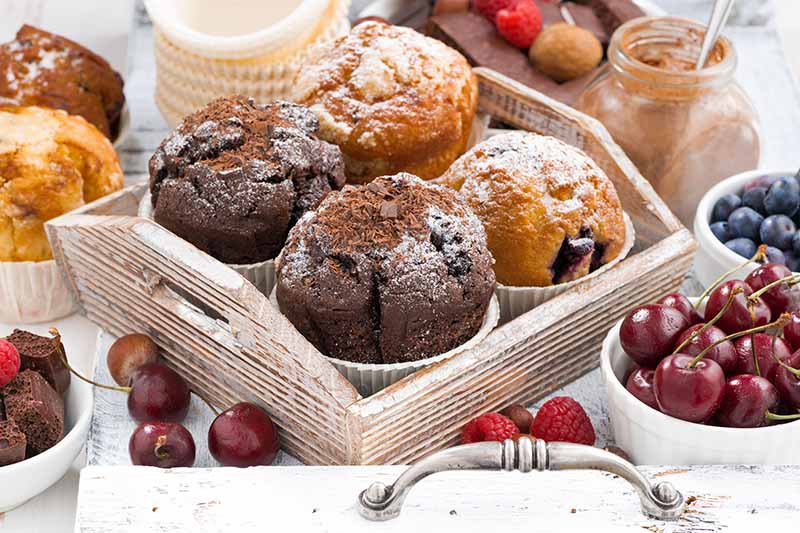
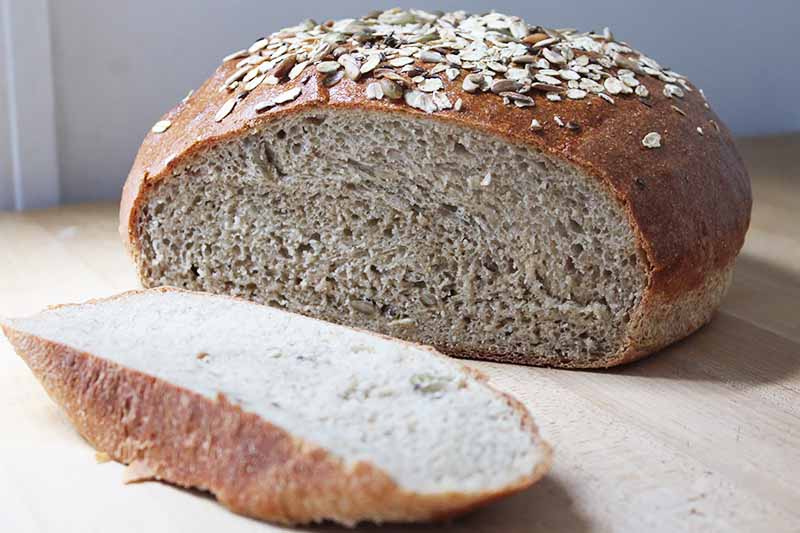
This dough turned out so wet that I couldn’t knead it. I literally had dough stuck all over my hands and counter top that I just scraped off and threw away. I tried adding more flour to dry it out. Terrible. I have made plenty of other breads and this one apparently is not good.
★★
You don’t knead soda bread. It only needs to be shaped in to a round with your hands on floured surface. But some very wet soda breads (e.g. brown soda with oats) should be spooned/poured into a baking tin like cake.